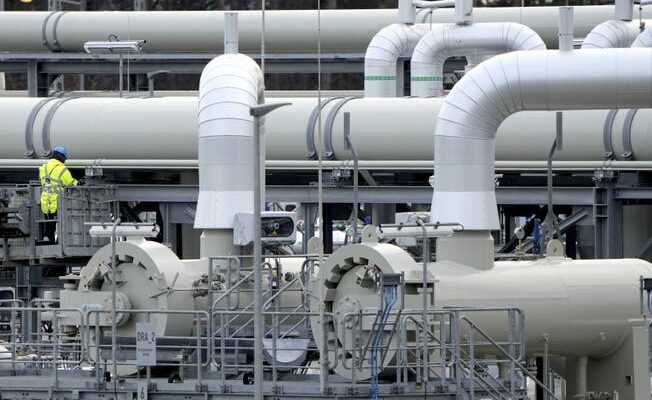Russia’s President Putin has issued a decree that Europeans can only buy Russian natural gas in rubles. They actually refused. However, the payment modalities now leave some room for manoeuvre.
The Russian natural gas would have arrived in Lubmin if Germany had not stopped the commissioning of Nord Stream 2.
Foreign buyers of Russian natural gas from countries classified as “unfriendly” due to the sanctions imposed on Russia will have to make payments in rubles from this Friday, April 1. Otherwise deliveries could be stopped. A week ago, President Vladimir Putin ordered payments to be made only in rubles.
On Thursday, the Kremlin published a decree by Putin setting out the modalities for Western customers. The announcement caused excitement and uncertainty, especially in the European countries that are particularly dependent on Russian gas. Now it seems as if the Kremlin, the central bank and the natural gas export monopoly Gazprom were looking for a Solomonic solution.
Mandatory account opening
The mandatory payment in rubles is therefore more appearance than reality. European clients will be required to open two “special accounts” with Gazprombank: one in rubles and one in foreign currency. They should transfer the contractually agreed price in euros to the latter. Gazprombank is authorized to exchange the transferred amount for rubles on the Moscow Stock Exchange and to transfer it to the ruble account. From there, the natural gas supplier – i.e. Gazprom – is then paid in rubles. This changes less than the Europeans had feared.
The Russian side avoided two other conceivable schemes that would probably have led to more resistance from the western states. The Europeans had assumed that they would have to convert the amount due into rubles themselves and transfer this ruble sum to Gazprom. Another possibility would have been that the European customers would still have paid in euros but would have transferred the money to a ruble account where it would have been automatically converted.
The solution now chosen leaves the conversion entirely to Gazprombank as the intermediary. However, it presupposes the willingness of Europeans to open accounts, including a ruble account, with Gazprombank, which deliberately has not been subject to sanctions. As a result, Gazprom and indirectly the Russian state will definitely secure the income from the gas business.
Pros and cons for Gazprom
From the Russian point of view, nothing changes in the contractual basis. The risk arising from the dependence on the ruble exchange rate remains with Gazprom. It is not, as some observers had assumed, transferred to the customer, and ruble prices are not suddenly charged, which would have made a contractual change absolutely necessary and thus made lengthy legal proceedings foreseeable.
For Gazprom, the new regulation is likely to have advantages and disadvantages. Like the economist Marcel Salikhow from the Higher School of Economics in Moscow told the Russian internet portal «The Bell», the obligation to process through Gazprombank reduces the risk of sanctions: the funds in foreign currency could be blocked less easily. In principle, however, little has changed.
However, Gazprom no longer receives foreign currency. Since the beginning of March, the group had already had to change 80 percent of sales made in foreign currencies into rubles within three days under the economic crisis regime. As do all importers. Now it’s actually 100 percent. This supports the ruble exchange rate, which has recovered strongly since the crash at the beginning of the “military special operation”, as the war in Ukraine is officially called. However, experts consider it to be artificial because it is currently hardly possible to conduct foreign currency transactions in Russia in view of the extensive currency controls caused by the crisis.
political sign
Putin’s decree gives the government commission for foreign investments the leeway to refrain from the new mode of payments in rubles in individual cases. That would make it possible to accommodate customers who, due to certain political constraints, cannot make the changeover. The Russian commodity expert Mikhail Krutichin pointed out in an interview that Putin was probably not aware of the risks associated with the changeover. If the Europeans refused to accept the terms of payment and stopped delivering gas, it would be a catastrophe for the Russian state, which is heavily dependent on gas exports.
In the form now presented, the change appears primarily in a political light. When the measure was announced, Putin had already lamented that the “collective West” had discredited its own currencies – the euro and the dollar – through its sanctions policy and in particular through the freezing of Russian currency reserves. On Thursday he said the West had decided to use the economy as a weapon against Russia. That is why Russia no longer wants to have anything to do with foreign currencies.
Germany and Italy see themselves as winners
Important purchasers of Russian natural gas in Europe see themselves as victors in this dispute. “The payment of Russian gas deliveries takes place in accordance with the existing contracts in euros and dollars,” wrote German Chancellor Olaf Scholz on Thursday evening on the short message service Twitter. It will stay that way and he made that clear in a conversation with Russian President Vladimir Putin, said Scholz.
Italian Prime Minister Mario Draghi calculates, according to the news agency Reuters not with delivery interruptions. Putin told him on the phone that the current contracts would remain in force and that European customers could continue to pay in euros and dollars. He may be wrong, but in his understanding the conversion of payments into rubles is an internal matter of the Russian Federation, Draghi said.
